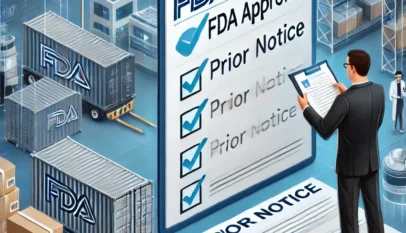Prior Notice FDA: Understanding Requirements for Importing Food Products
The FDA’s prior notice process is a critical step for importers of food and agricultural products entering the United States. It requires that importers submit information about the goods they are bringing into the country at least two hours before arrival, ensuring compliance with health and safety regulations. This requirement not only facilitates smoother customs procedures but also protects American consumers from potential food safety hazards.
Understanding the specifics of Prior Notice FDA can significantly impact the efficiency of import operations. Various requirements and timelines exist based on the type of shipment and mode of transport, making it essential for businesses to stay informed. Being proactive in managing these details can prevent costly delays and enhance the overall import process.
As regulations continue to evolve, staying updated on the FDA’s prior notice requirements is more important than ever. This article aims to provide clarity on the process, its significance, and tips for ensuring compliance. The insights shared will equip readers with the knowledge needed to navigate these regulations effectively.
Understanding Prior Notice Requirements
Prior notice requirements play a critical role in ensuring the safety of food imported into the United States. These regulations outline the obligations of importers in notifying the FDA before food shipments arrive, highlighting the legal framework, the specific food categories affected, and the submission timelines.
Legal Basis for Prior Notice
The legal foundation for prior notice regulations stems from the Public Health Security and Bioterrorism Preparedness and Response Act of 2002. This act mandates that all food imports provide the FDA with advance notice to facilitate inspections and ensure food safety.
Regulations found in 21 U.S.C. § 381 provide specific guidelines. Importers must submit prior notice through the FDA’s Prior Notice System Interface (PNSI) at least two hours before arrival for land, and four hours for air shipments. Failure to comply may result in refusal of entry.
Food Categories Subject to Prior Notice
Certain food categories require prior notice based on potential risk factors. These include:
- Human Food: All items intended for human consumption, excluding certain low-risk foods.
- Animal Food: Foods intended for pets and livestock.
- Dietary Supplements: Products marketed for health benefits that may not be considered traditional food.
Some exceptions apply. For instance, food imported for research or personal use may not require prior notice. It is crucial for importers to be aware of these categories to ensure compliance.
Timeframes for Submission
Timelines for submitting prior notice are key to compliance. The FDA mandates that prior notice must be submitted:
- For land shipments: At least two hours before the food arrives at the U.S. border.
- For air shipments: A minimum of four hours prior to arrival.
- For sea shipments: The notice should be filed at least 24 hours before the vessel’s arrival.
Accurate and timely submissions are essential. Failure to meet these deadlines can result in regulatory actions, including withholding or denial of entry into the U.S.
Compliance and Enforcement
Adherence to the prior notice requirements set forth by the FDA is crucial for importers and manufacturers. Understanding the submission processes, the consequences of non-compliance, and the guidance available can help ensure smooth operations and mitigate risks.
Submission Processes
Importers must submit prior notice to the FDA before the arrival of food or beverage shipments in the U.S. This submission can be made electronically via the FDA’s Prior Notice System Interface (PNSI) or other authorized methods. Importers must provide specific information, including:
- Product name
- Origin country
- Manufacturer details
- Estimated arrival date
Submissions should be made at least 2 hours before arrival by land and 4 hours for air shipments. Failure to comply can result in delays and rejections at entry points, impacting import schedules and costs.
Consequences of Non-Compliance
Non-compliance with prior notice regulations can lead to several repercussions. Shipments may be held at the port of entry for further inspection. If no prior notice is filed, the FDA can refuse the imported goods, leading to additional costs for storage or waste disposal.
Other consequences include:
- Increased scrutiny for future shipments
- Potential fines or penalties imposed
- Legal action for repeat offenders
Maintaining compliance is vital to avoid these challenges and ensure uninterrupted access to the U.S market.
Guidance for Importers and Manufacturers
To navigate the complexities of prior notice requirements, importers and manufacturers can seek guidance from the FDA. The FDA offers several resources, including:
- Online training modules for understanding prior notice protocols
- Customer support for specific inquiries
- Documentation checklists to ensure all necessary information is included
Utilizing these resources can enhance understanding and compliance. Staying informed about regulatory changes also helps to mitigate risks associated with non-compliance. Regularly reviewing internal procedures and training staff can further support adherence to FDA requirements.
Vaishno Devi Helicopter Booking: Your Complete Guide for a Hassle-Free Pilgrimage
Visiting Vaishno Devi is a spiritual journey that attracts millions of pilgrims each year.…














